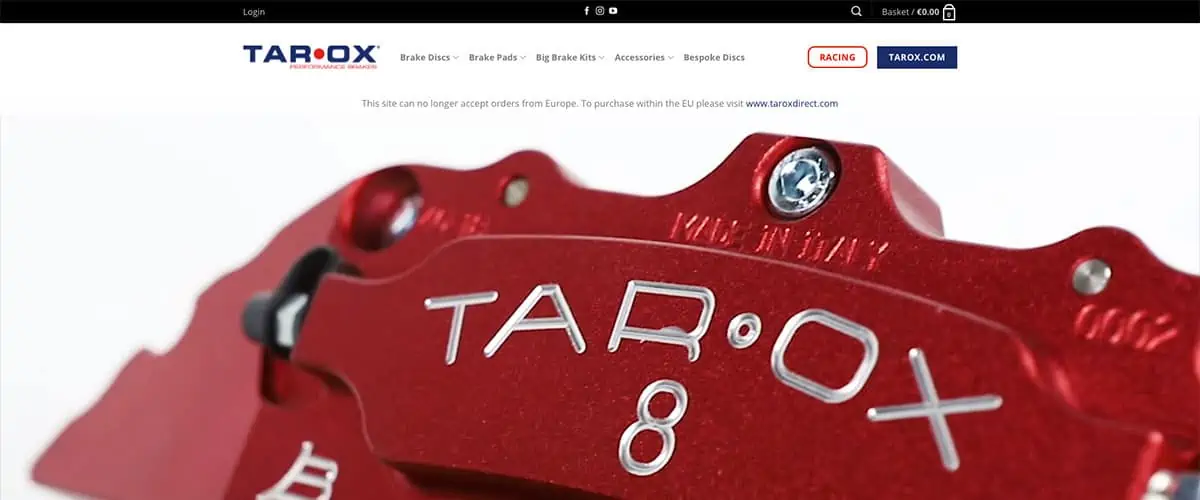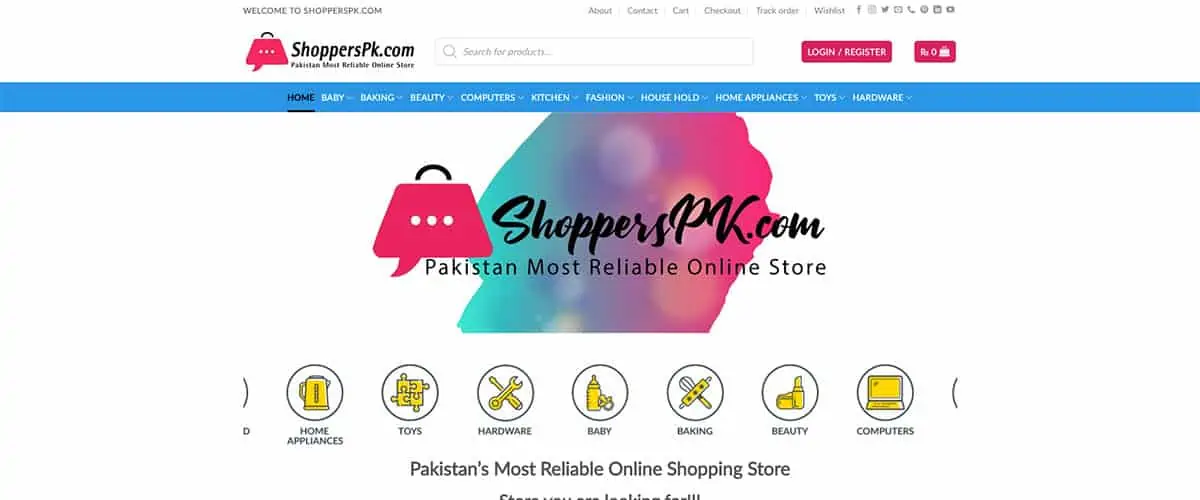WooCommerce is great for new Ecommerce stores with a few hundred products. But is it scalable enough to sell tens of thousands of products? If you have the same question, stay tuned. In this guide, you’ll learn:
Table of Contents

Let’s get started by answering these questions: What is WooCommerce? Is it a good choice for large stores?
Is WooCommerce A Right Choice For Large Scale Stores?
Yes, definitely. 68,000 of the world’s top one million websites use WooCommerce. That’s an impressive 6.8% of the top million. In total, over 3.8 million websites use WooCommerce, which is 0.2% of all websites on the internet. If we look at only Ecommerce stores, WooCommerce powers 28% of them.
Inter-Shop, ShoppersPk, Blackred, and Hennings Wine are popular Ecommerce websites that use a WooCommerce store.
How Does WooCommerce Work?
Unlike other popular Ecommerce platforms like Shopify and Magento that have a dedicated platform, WooCommerce is available as a free plugin with WordPress. You can add Ecommerce functionality to your WordPress website by simply installing the WooCommerce plugin. This also makes WooCommerce significantly easier to use.
To install WooCommerce, go to the Plugins section on your WP dashboard and search for “WooCommerce.” Right-click on the WooCommerce plugin from the search results and click on Install Now. WordPress will automatically install the plugin to your site.
The core plugin comes with all the essential Ecommerce features, including:
- Inventory management
- Payment functionality
- Shipping
- Tax calculations
Also, you can use over 300 free and paid WooCommerce plugins to enhance your store’s functionality.
In particular, WooCommerce security is based on the plugins you install and your site hosting security. This allows you to make your large WooCommerce site as secure as you want.
WooCommerce Team’s Take on Scaling
If you’ve heard that WordPress and WoCommerce are suitable for small online stores only, you’re not alone. It’s a common myth that WoCommerce is good for only a small Ecommerce store. The WooCommerce team mentions on their FAQ page WooCommerce stores can list several products and handle numerous transactions daily.
The team also states that the “sky is the limit” for the number of products you can add to your WooCommerce online shop. They’ve seen stores with over 100,000 products running without any issues.
However, the team pointed out that certain factors can affect the performance of a WooCommerce store. The hosting company also plays a vital role in the website’s load speed.
Is There an Actual Product Limit for WooCommerce Users?
Technically, WooCommerce doesn’t impose a limit on the number of products you can add to your Ecommerce site. However, that doesn’t mean you can add millions of products to your site and still expect the same website speed, loading time, and performance.
Let’s mention hardware here. The performance of a WooCommerce site depends on the server hardware — RAM and CPU. Typically, a server can handle some tens of million products (all sites combined). If this limit exceeds, your site may face performance issues like slow page load time.
WooCommerce doesn’t mention any way to increase this limit. If the server reaches its limit, the effects will be visible on your site. That’s why it’s critical to choose the right hosting provider.
To better understand the limitations to scale WooCommerce, let’s discuss the hard limit and soft limit of WordPress.
Hard Limit
WordPress comprises PHP code and MySQL database. Since MySQL base is not a distributed database, it can only run limited database queries. The load can’t be distributed on multiple machines, so adding more hardware won’t help.
Soft Limit
MySQL doesn’t handle search and dynamic filtering well. On paper, WordPress can manage a few tens of million products per server, but MySQL’s search limitations reduce it to a few thousand only. Thankfully, you can overcome these limitations by using full-text technology like Apache Solr and Elasticsearch.
Some Examples of Large-Scale WooCommerce Stores
Large-scale WooCommerce stores are Ecommerce stores built on WooCommerce that have over 5,000 products. Some large WooCommerce stores carry over 50,000 products, but any store with over 5,000 products falls into the category of large-scale stores.
Please note that more products don’t essentially mean more orders. A store might have 15,000 products and get only 10,000 orders a month. In contrast, a store with only 500 products can get 500,000 orders a month.
However, the number of products listed in a store is the standard marker for measuring how large a store is.
Some Large-Scale Stores WooCommerce Stores are:
- Intershop: 158,000+ products
- Gifts and Jewels: 51,300+ products
- Tarox: 40,000+ products
- Soul Brother: 30,000+ products
- ShoppersPk.com: 25,000+ products
- Hennings Wine: 11,100+ products
- Bible Land Pictures: 10,400+ products
- Blackred.id: 8,500+ products
- Branded Biker: 7,500+ products
- MCudstodning.dk: 6,000+ products
Factors Affecting The Scaling of a WooCommerce Store
As discussed, the WooCommerce team states you can list an infinite number of products on a WooCommerce site. However, the ability to add unlimited products doesn’t mean you can add them and run your store without worrying about performance issues.
Let’s look at four factors that affect WooCommerce scaling.
Analyzing Four Large-Scale WooCommerce Stores
In the previous sections, we mentioned a few large-scale WooCommerce stores with over 5,000 products. Let’s now analyze four WooCommerce stores with over 10,000 products and how they compare in terms of look and performance.
WooKeeper collected 4 sites with more than 10.000 products to see how they did. Let’s have a look at the results.
Inter-Shop is a popular online electronics store based out of Greece. It’s a multi-vendor marketplace like Amazon that sells products of various Greek companies. The store has categories like gadgets, automobile tools, electrical appliances, etc., and ships across the globe.
The site uses the Flatsome WordPress Theme, which ranks 13th in terms of UX and performance. The theme is highly customizable, and also simple and easy to use. Inter-Shop also uses Cloudflare to enhance the website’s security, speed, and performance. With an inventory of over 150,000 products, Inter-Shop is a classic example of how scalable WooCommerce can be.
Besides, the website uses W3 Total Cache as the caching plugin. It supports various payment methods: COD, direct bank transfer, and PayPal.
When analyzed by GTmetrix, a website performance testing and monitoring tool, Inter-Shop had the following results:
- PageSpeed Score: 93%
- Fully Loaded Time: 6.1 seconds
Hennings Wine is a Sussex-based wine store with over 11,000 products. The store ships all across the UK and some parts of Europe. It’s hosted on Amazon Web Services, one of the best hosting providers in the world. The site has a top-notch user interface.
Hennings Wine supports SagePay to facilitate credit and debit card transactions. The website doesn’t use any caching plugins; however, it does a great job at keeping its code clean.
GTmetrix analysis of Hennings Wine showed the following results:
- PageSpeedScore: 56%
- Fully Loaded Time: 10.4 seconds
Tarox is a UK-based automobile accessories store that sells over 40,000 products. Based on WooCommerce, Tarox ships to almost all major countries worldwide. Coming to design, Tarox runs on a fully custom theme built entirely over WooCommerce.
The website supports various payment options, such as SagePay for credit/debit cards and direct bank transfer for Euro payments only. What’s surprising is that the website doesn’t use any caching plugin and still achieves a decent loading speed.
When analyzed by GTmetrix, the website performance was as follows:
- PageSpeedScore: 48%
- Fully Loaded Time: 13.1 seconds
ShoppersPk is one of the largest Ecommerce websites in Pakistan, with over 25,000 products. The store ships all over Pakistan but not internationally. The website uses the Flatsome theme, the same theme used by Inter-Shop. ShoppersPk supports three payment modes: cash on delivery (COD), bank transfer, and wallet transfer.
Surprisingly, the website uses no caching plugin. The site uses Cloudflare to enhance speed and security.
GTmetrix analysis showed the following results:
- PageSpeed Score: 91%
- Fully Loaded Time: 10.1 seconds
How to Optimize Your WooCommerce Website for Better Scalability and Performance?
In one of the previous sections, we discussed some factors that could slow down a WooCommerce site. Now, let’s look at a few steps a WooCommerce store owner can take to improve website speed and performance.
Analyzing How Many Products Can WooCommerce Handle with Live Examples
The WooCommerce team mentions that WooCommerce is ideal for large-scale stores, and you can add as many variable products WooCommerce as you want. However, the FAQ section vaguely says that the performance of a WooCommerce site depends on the number of orders, hosting company, and traffic, but gives no clear insights into how scalable it is.
Premmerce, a WooCommerce solutions company, conducted real-life testing to determine the scalability and performance of WooCommerce stores.
The stores included in the testing had 50k products, 50 categories, 1000+ products per category, 15 as many attributes, 50k variable products, and three photos per product.
Let’s summarize the real life test and results.
Homepage
Homepage testing resulted in 286 queries with an average page load time of 569 ms. The minimum and maximum page load times were 413.9 ms and 1.89s, respectively. The average server response time was 298.85 ms, and the number of virtual users was 50.
The testing found that the number of products didn’t affect the homepage load time. WooCommerce stores with shared hosting, distributed CMS, and a single server showed a good average load time of under 2 seconds.
Small Product Category Without Filters
The test included a store product base of 50k products, with one category having at least 1k products. Total queries were 275. The average page load time was 591.16 ms, with the minimum and maximum load times being 500.37 ms and 2.14s, respectively. Similarly, the average server response time was 296.28 ms.
To conclude, the number of products didn’t impact the store’s performance if a single category contained 1,000 physical products.
Small Product Category Without Filters
The test included a store product base of 50k products, with one category having at least 1k products. Total queries were 275. The average page load time was 591.16 ms, with the minimum and maximum load times being 500.37 ms and 2.14s, respectively. Similarly, the average server response time was 296.28 ms.
To conclude, the number of products didn’t impact the store’s performance if a single category contained 1,000 physical products.
Big Product Category Without Filters
This test included a store product base of 50k products, with the tested category having 50k products. Total queries were 272. The average page load time was 766.73 ms, with the minimum and maximum page load time being 598.71 ms and 2.93s, respectively. The average server response time was 424.54 ms.
Clearly, the average page load time and server response time were significantly higher for a large category with 50k products.
Small Product Category with Filters
The tested category in this test comprised 1k products; however, an attribute filter was also used. Total queries were 276. Here, the minimum page load time was 1.19s, with the minimum and maximum load time being 912.28 ms and 3.6s, respectively. The average server response time was 834.74 ms.
The testing concluded that adding attribute filters to product categories increased the average page load time by 2x and server response time by 4x.
Small Product Category with Premmerce Filters
This time, testers used the same product category size but used their own attribute filter. Total queries were 279. The average page load time was 703.85 ms, with the minimum and maximum load time being 617.07 ms and 2.76s, respectively. 352.96 ms was the average server response time. The test showed that using a different filter can improve store performance.
Individual Product Page
In the end, testers tested an individual product page with three photos, 15 attributes, and two options. Total queries were 288. The average page load time was 625.97 ms, with the minimum and maximum load times being 512.88 ms and 2.48s, respectively. The average server response time was 298.91 ms. Hence, a large product database didn’t affect the store’s speed and performance.
Wrap Up
WooCommerce is indefinitely scalable, as claimed by the WooCommerce team. However, it’s not practically possible, and you might face performance issues as you scale up your store. Scalability problems are because of the limitations of the server and the content delivery network.
Tests conducted with live examples showed that the number of products on a WooCommerce store doesn’t affect scalability. However, too many products in a single category can significantly affect page speed and server response time.
Overall, including fewer products in each category and following best practices like improving caching, minimizing code, and enhancing hosting server capacity can help you scale your WooCommerce store seamlessly.Using the wrong site structure and platform is one of the reasons why Ecommerce businesses fail. WooCommerce, built on the WordPress platform, is flexible and scalable. Your business should find all the capabilities it needs on this platform.








